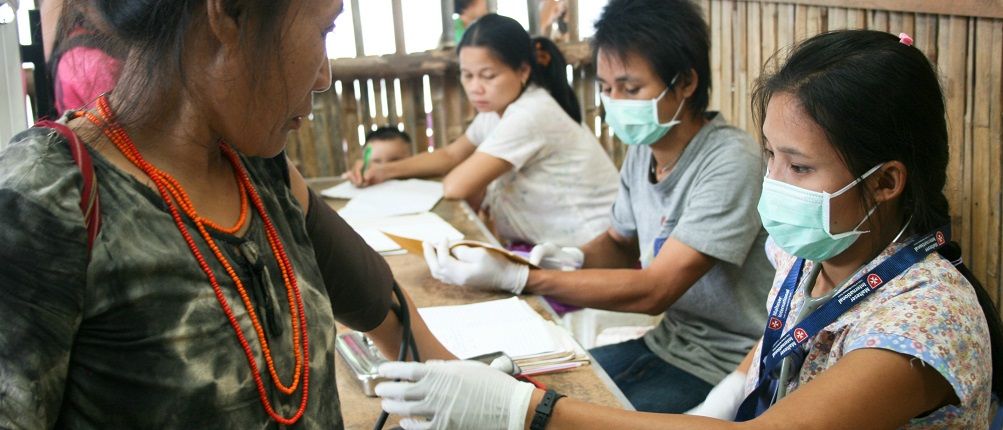
Medical relief for refugees
For more than 30 years, residents from Myanmar, mostly from the Karen ethnic group, have been fleeing to Thailand to seek refuge from human rights abuses and conflict between armed opposition groups and the Myanmar military.
Malteser International has been implementing a project providing medical care to approximately 20,000 Karen and Burmese refugees in two refugee camps – Mae Ra Ma Luang and Mae La Oon – at the Thai-Myanmar border since 1993. The project includes both curative and preventive measures to improve the health status of refugees, as well as a training component to strengthen the self-help skills of the population and thereby prepare them for a possible return to their home country.
Despite a considerable amount of resettlement in third countries, approximately 100,000 people still live in nine refugee camps along the Thai-Myanmar border. As income opportunities are limited, these refugees are fully dependent on international support for shelter, food, education, water/ sanitation and health services. Several local and international NGOs – such as Malteser International – supply these services in close co-operation with trained camp residents in order to ensure they have access to essential facilities. The Royal Thai Government’s role is to provide the location and ensure security, as well as to supervise and coordinate NGO activities through the Ministry of the Interior.
- Reduce mortality and morbidity among the refugees
- Control communicable diseases
- Limit the risk of epidemics and disease outbreaks
- Improve the capacities of camp health staff
- Increase the participation of camp communities in planning, implementing and monitoring promotional health activities
Preventive and curative health care:
- Medical care and nursing care in camp clinics
- Referral system for patients with complicated diseases or fractures to Thai hospitals and coverage of treatment costs
- Provision of medicine, medical supplies and equipment
- Health screening and bi-annual de-worming campaigns in schools and nursery schools
- Dental health and hygiene in camp schools (supported by Dr. Ulrich Reiter)
- Psychosocial care services
- Services (e.g., physical therapies, occupational therapies, etc.) and assistive devices for people with disabilities
- Prevention and control of communicable disease outbreaks such as COVID-19
Maternal-child health and food security:
- Pre- and postnatal care for pregnant women and referral of women with high-risk pregnancies to Thai hospitals.
- Immunization of children
- Provision of therapeutic and complementary foods for malnourished children, including cooking demonstrations
Water, sanitation and hygiene:
- Construction and maintenance of water and sanitation facilities
- Waste management
- Soap production and distribution
- Malaria control
Capacity Building:
- Training of Karen health staff (e.g. Medics, Nurses, Midwives, Community Health Workers)
- Conduct cluster health meetings and household visits in camp sections through trained community health workers
- Awareness raising through the conduction of regular camp-wide promotional health campaigns
Country info
Capital: Bangkok
Area: 513,120 km²
Population: approx. 70 Million
Project data
Donors: European Union (INTPA), International Rescue Committee (IRC), Global Fund (GF), Else Kröner-Fresenius-Stiftung, Germany's Relief Coalition (Aktion Deutschland Hilft), World Child Future Foundation, Thai.Ger Supporters, Dr. Ulrich Reiter and private donations
Partners: Humanity and Inclusion, local health authorities, village committees, Karen Refugee Committee, Camp Committees








